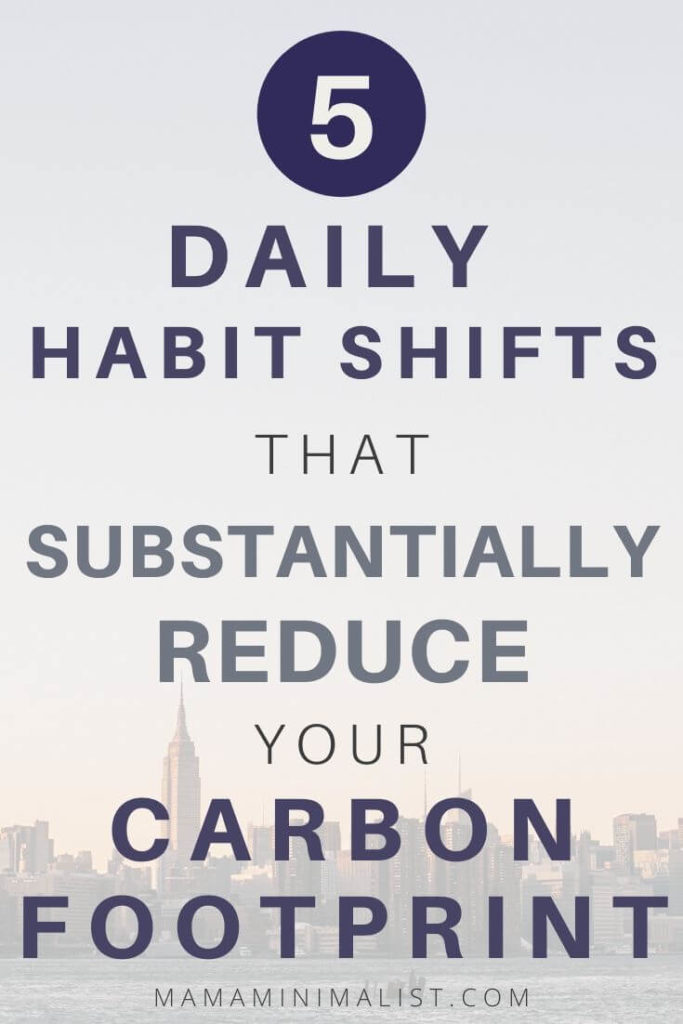What Your Carbon Footprint Is (And Why You Should Care)
What your carbon footprint is (and why you should care)
Carbon footprints can be difficult to understand. What’s a carbon footprint, exactly, and how is yours related to climate change?
Your carbon footprint is the total amount of greenhouse gases including carbon dioxide and methane that are generated by your lifestyle in one year. Footprints are generally measured in metric tons.
Your diet, travel habits, and your home’s cooling and heating practices are some daily choices that impact your unique footprint.
The collective carbon footprints of every human on Earth amounts to 30 billion metric tons per year. (You can calculate your unique carbon footprint here.)
… But how are carbon footprints related to climate change?
Greenhouse gases (i.e. carbon dioxide and methane) trap heat within our atmosphere. A warming planet in part exacerbates climate change.
Climate change is responsible for a host of environmental problems including melting glaciers, severe storms, sea level rise, animal extinction, ecosystem loss, and more.
The average carbon footprint for an American is among the highest in the world at 16 metric tons. Globally, the per person average is closer to 4 tons.
To have the best chance of avoiding a 2 degree Celsius (3.7 degree Farenheit) rise in global temperatures, the average global carbon footprint per person must drop to under 2 tons by 2050.
Reducing your carbon footprint is the result of a series of lifestyle tweaks that are done concurrently, every single day.
5 lesser-known facts about carbon footprints:
1. Your carbon footprint is greatly intertwined with affluence.
Thanks to an overabundance of resources including food, water, and energy, citizens of developed countries have the highest carbon footprints in the world.
You do not have to consider yourself rich in order to be globally affluent. Poorer people in wealthy countries have disproportionately large footprints compared to the global average.
You can find The Sustainable Minimalists podcast wherever you listen to podcasts.
Apple Podcasts | Google Podcasts | Spotify | Stitcher
2. 4 specific habits have the biggest probabilities of lowering your carbon footprint.
Although small, daily habits are important, they will likely not lower your footprint all that much.
If you want to get serious about lowering your carbon footprint, there are 4 specific habits that will substantially do just that:
Eat a plant-based diet
Meat products have bigger carbon footprints per calorie than grains or vegetables.
That’s because animals like cattle, sheep and goats produce excessive methane. It’s also because trees – which are carbon suckers and actually remove carbon from the air – are often cut down to make room for grazing cattle.
A meat-loving diet adds 3.3 tons to your annual carbon footprint.
A vegetarian diets adds 1.7 tons to your annual carbon footprint.
But a vegan diet? A plant-based diet adds just 1.5 tons to your number (source).
Switching from a meat loving diet to a vegan one reduces your carbon footprint by 1.8 tons per year.
Live car-free
If you sell your car, you will conserve approximately 2.6 tons of CO2 annually.
Avoid one transatlantic flight a year
Just one round trip flight from Boston to London generates 1.57 tons of CO2.
One round trip flight from Boston to Sydney, Australia generates 6 tons.
Flying less (or not at all!) substantially reduces your impact on the planet.
Have a smaller family
Live in the United States? If you have one less child, you will reduce your household’s carbon footprint by 16 tons per year.
3. Reducing waste also reduces your carbon footprint.
Reducing waste lowers your carbon footprint, too, but marginally.
For every 10% of waste reduction, you also reduce your carbon footprint by approximately half a ton.
[Related: The Zero-Waste Swaps that Save Serious Money]
4. Just 100 companies are responsible for more than 70% of the world’s carbon emissions.
The biggest offenders on this 100 list are fossil fuel companies including Chevron, Exxonmobil, BP, and Saudi Aramco, to a name a few.
While it is certainly important for you and I to take small actions within our homes, real change happens by putting significant political pressure on our elected officials to regulate the fossil fuel industry.
5. When it comes to global warming, 2020 is a big year for the United States.
More specifically, the 2020 presidential election is a big event for the United States’s environmental policies.
The Paris Climate Agreement of 2015 was a landmark agreement by nearly 200 countries to address climate change and substantially curb global greenhouse gas emissions to less than 3.6 degrees Fahrenheit by 2050.
But on November 4, 2019 President Donald Trump formally notified the United Nations that the United States would be leaving the Paris Agreement.
Still, even though Trump pledged to leave, just pledging it so doesn’t make it immediately happen, as the rules for leaving the Paris Agreement state that a country must wait one entire year after making a formal declaration.
Trump made his formal withdrawal on November 4, 2019. The actual withdrawal – and the actual rolling back of clean energy standards, then – will not go into effect until Nov 4, 2020, which is the day after the 2020 presidential election here in the United States.
If Trump loses reelection, our new president can easily retract Trump’s formal declaration and recommit the United States to the terms set forth in the Paris Agreement.
But if Donald Trump wins reelection, we will see relaxed restrictions on the fossil fuel industry as well as even more relaxed standards on environmental issues.
It’s important to note, too, that while the rules for leaving the Paris Agreement are convoluted, it is quite easy to re-join. A future president, in 2024, let’s say, could rejoin the pact in as little as one month’s time.





One thought on “What Your Carbon Footprint Is (And Why You Should Care)”
I love this, such a clear breakdown with resources. I was shocked to see that only 100 companies are responsible for more than 70% of the world’s carbon emissions. 🤯🤯
Comments are closed.